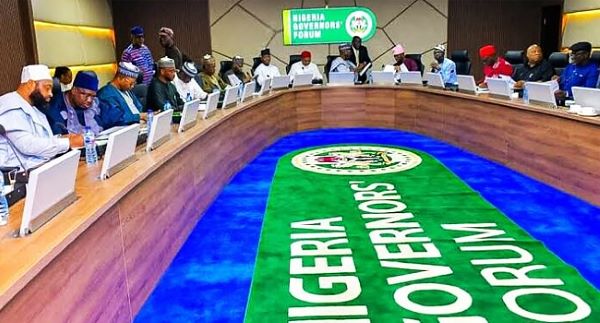The Nigeria Governors’ Forum (NGF) has endorsed a revised Value Added Tax (VAT) sharing formula and other critical tax reforms aimed at fostering equitable resource distribution and modernizing Nigeria’s tax system.
The announcement was made in a communiqué issued on Thursday, signed by AbdulRahman AbdulRazaq, NGF Chairman and Governor of Kwara State. The communiqué followed consultations with the Presidential Tax Reform Committee and stakeholders such as the Federal Inland Revenue Service (FIRS).
The key resolutions arrived at during the meeting include:
- Revised VAT sharing formula
The NGF approved a new VAT-sharing formula designed to ensure fairness:- 50% based on equality30% based on derivation20% based on population
- Governor Yahaya urged the National Assembly (NASS) to reject the bill, while President Bola Tinubu encouraged continued dialogue through the legislative process.
- Comprehensive tax reform
The NGF reiterated its support for overhauling Nigeria’s outdated tax laws to enhance fiscal stability and align with global best practices. - Tax rate adjustments
- No increase in the VAT rate or reduction in Corporate Income Tax (CIT) for now, maintaining economic stability.
- Proposed gradual reduction of the CIT rate from 30% to 25% over two years.
- Reduction of the VAT rate to 0% on essential items, with rates for non-essential goods increasing to 10% by 2025, 12.5% by 2029, and 15% by 2030.
- Exemptions and safeguards
- Essential goods and agricultural produce will remain exempt from VAT to protect citizens’ welfare and boost agricultural productivity.
- Continuation of funding for agencies like TETFUND, NASENI, and NITDA, ensuring their operations are not disrupted.
- Introduction of development levy
A 4% development levy will be introduced to harmonize and phase out earmarked taxes. - Support for the legislative process
The NGF endorsed the continuation of the legislative process at the National Assembly, culminating in the passage of the Tax Reform Bills.
Reactions to the proposal
Taiwo Oyedele, Chairman of the Presidential Committee on Fiscal Policy and Tax Reforms, responded to the Northern Governors’ Forum’s opposition, stating that the current VAT distribution model is unfair to all geopolitical zones. The proposed model aims to balance resource allocation by considering where goods are consumed or supplied.
Current VAT allocation framework
Under Section 40 of the VAT Act, VAT revenue is currently allocated as follows:
- 15% to the Federal Government
- 50% to States and the FCT
- 35% to Local Governments, with 20% of the state and local government share based on derivation.
Additional factors include:
- 50% based on equality
- 30% based on population
A 4% collection fee goes to FIRS, and 2% to NCS for import VAT.
The proposed tax reforms, which have passed the second reading in the Senate, represent a step toward addressing long-standing disparities in Nigeria’s fiscal policies while fostering economic stability and fairness.


